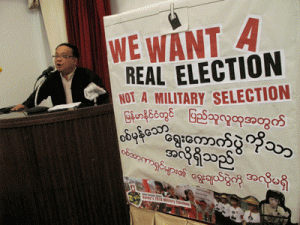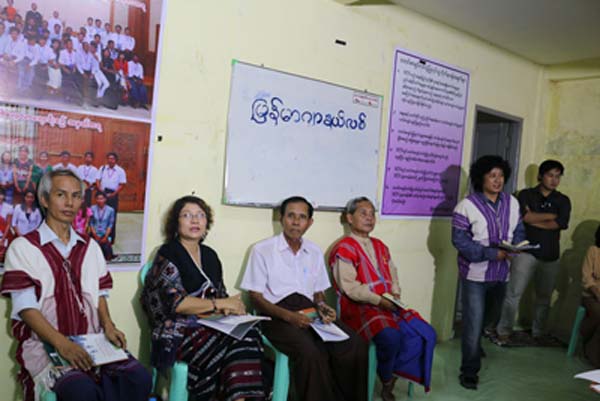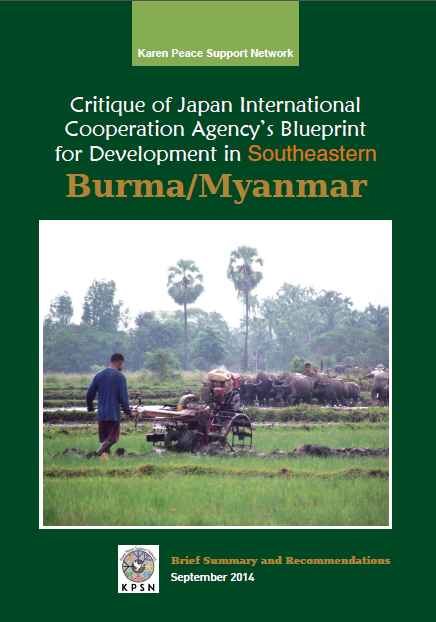Posts Tagged ‘Karen Peace Support Network’ (5 found)
Free and Fair Elections for Whom?
 Last week, Burma’s Union Election Commission (UEC) declared that the General Elections would be set for 8 November of this year. Having previously boycotted the 2010 election on the grounds the election rules were unfair, the opposition National League for Democracy (NLD) has agreed to contest the military-backed Union Solidarity and Development Party (USDP), who currently holds power […]
Last week, Burma’s Union Election Commission (UEC) declared that the General Elections would be set for 8 November of this year. Having previously boycotted the 2010 election on the grounds the election rules were unfair, the opposition National League for Democracy (NLD) has agreed to contest the military-backed Union Solidarity and Development Party (USDP), who currently holds power […]
Asian Highway Project Undermines Peace in Karen State
(10 July 2015) – The Karen Peace Support Network (KPSN) is alarmed by recent fighting between the Burma Army and the Democratic Karen Benevolent Army (DKBA) along the recently completed section of the Asian Highway between Myawaddy and Kawkareik. The Burma Army began heavy fire on DKBA positions along the road in the early morning of 2 July. Fighting has lasted for one week, has spread to other parts of Karen State, and tensions remain high. This is the fourth instance of armed clashes in the area in the past year, breaking out amidst rising tensions over control of the highway, which is slated to officially open later this month […]
• • •Karen Civil Society Rallies Around Japan’s Harmful Plans for Eastern Burma
 Japan’s lofty development plans for eastern Burma were very publicly rejected by the Karen Peace Support Network (KPSN) at a press conference in Rangoon, citing lack of consultation with communities and the potential for such plans to fuel conflict. Based on a blueprint for extensive development projects produced by the Japanese International Cooperation Agency (JICA), the overseas development arm of the Japanese government, 28 Karen civil society organizations that form the KPSN, released a report to outline their concerns and recommendations. JICA’s blueprint, in which its main goal is to support the return of refugees and internally displaced persons (IDPs), contains four main components; economic corridors, free trade zones and industrial estates, industrial clusters, and urban development. The Japanese government has been working closely with both the Union level and State level Burmese Government in the development of this plan.
Japan’s lofty development plans for eastern Burma were very publicly rejected by the Karen Peace Support Network (KPSN) at a press conference in Rangoon, citing lack of consultation with communities and the potential for such plans to fuel conflict. Based on a blueprint for extensive development projects produced by the Japanese International Cooperation Agency (JICA), the overseas development arm of the Japanese government, 28 Karen civil society organizations that form the KPSN, released a report to outline their concerns and recommendations. JICA’s blueprint, in which its main goal is to support the return of refugees and internally displaced persons (IDPs), contains four main components; economic corridors, free trade zones and industrial estates, industrial clusters, and urban development. The Japanese government has been working closely with both the Union level and State level Burmese Government in the development of this plan.
For Karen civil society, however, there are many concerns, as outlined in the report released on 9 September. Although the blueprint aims to “promote peace through development,” JICA has not conducted a conflict analysis on what is an extremely complicated and fragile context. In fact the plans could serve to exacerbate conflict by facilitating land confiscation, one of the loci of tension in the ceasefire process. Also, improving transport and road access to areas traditionally held by ethnic armed groups such as the Karen National Union (KNU), allows easy access for Burma Army soldiers to the heart of Karen areas. We must not forget the abusive nature of the Burma Army that has been terrorizing civilians for decades and continues to do so, despite a ceasefire in place. Will exposing more communities, who are already vulnerable to abuses, to the unreformed Burma Army really aid peace […]
• • •Critique of Japan International Cooperation Agency’s Blueprint for Development in Southeastern Burma/Myanmar
The Japan International Cooperation Agency (JICA) has recently issued a blueprint that proposes industrial development in Southeast Burma/Myanmar, purportedly to aid in the return and settlement of refugees and Internally Displaced Persons (IDPs) in Karen and Mon States. However, the Karen Peace Support Network (KPSN), a network of nearly 30 ethnic Karen organizations, cautions JICA that its blueprint for infrastructure development such as roads and industrial estates in the war-torn southeast is premature and flawed, potentially exacerbating conflict in the region.
The KPSN (formerly KCBPSN) is the largest network of Karen civil society organizations in Burma/Myanmar. These organizations have been providing support for vulnerable people in this conflict-torn region for decades, striving to empower local communities, build transparent and accountable institutions, and help create a sustainable peace in Burma/Myanmar. KPSN and its member organizations are important stakeholders which must be included in any development planning process in the Karen areas of the southeast […]
• • •New Report: Japan – Burma Plan Could Fuel Conflict in Ethnic Areas
Japan’s new development plans for Southeast Burma could fuel conflict rather than promote peace, warns the largest network of ethnic Karen organizations in the country in a report it will release today in Yangon.
The Karen Peace Support Network (KPSN) launches its report today – Critique of Japan International Cooperation Agency’s Blueprint for Development in South-Eastern Burma/Myanmar – at the Myanmar Journalist Network (MJN) office in Yangon […]
• • •









 All posts
All posts